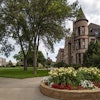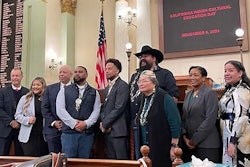OKLAHOMA CITY
A medical study led by a University of Oklahoma health researcher shows that American Indians have more strokes and a higher fatality rate from their first stroke when compared to Whites and Blacks.
“Smoking, high blood pressure and a lack of exercise can be major predictors of a stroke, and those risk factors are significant in American Indians,” said Dr. Ying Zhang of the OU Health Sciences Center in Oklahoma City.
Zhang and colleagues analyzed 4,549 middle-aged and older people in the Strong Heart Study involving 13 American Indian tribes or communities.
It is the largest epidemiologic study of cardiovascular-related disease in American Indians, according to OU officials.
Findings were published online this week in “Circulation: Journal of the American Heart Association.”
A stroke occurs when the blood supply to part of the brain is suddenly interrupted, or when a blood vessel in the brain bursts, spilling blood into the spaces surrounding brain cells. Brain cells die when they no longer receive oxygen and nutrients from the blood, or there is sudden bleeding into or around the brain.
About 25 percent of people who recover from their first stroke will have another stroke within five years.
The stroke study, that was launched in 1989, showed that American Indians had a stroke fatality rate 1.5 times higher than the rates found in other U.S. populations.
Steve Young, chief of preventive heath for the Choctaw Nation in Talihina, said American Indian leaders must work to combat obesity and smoking. People have choices, “they don’t have to be overweight or start smoking cigarettes,” Young said.
“It’s a lot easier to start a good habit than stop a bad habit,” Young said.
Symptoms of stroke include sudden numbness or weakness, especially on one side of the body, sudden confusion or trouble speaking or understanding speech, sudden trouble seeing in one or both eyes, sudden trouble walking and sudden severe headaches with no known cause.
Email the editor: [email protected]
Click here to post and read comments
© Copyright 2005 by DiverseEducation.com


















